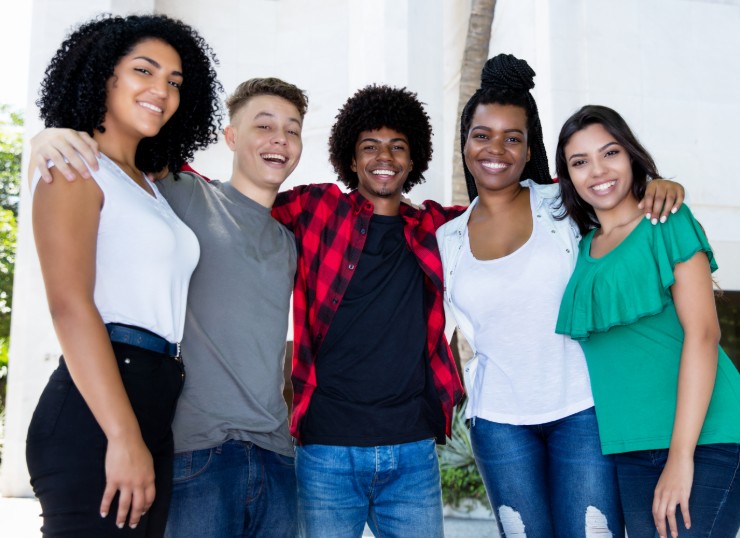- July 1, 2022
- Laurie Wilson
- No Comments
July is National Minority Mental Health Awareness Month and was formally recognized by Congress in 2008 to bring awareness to the unique struggles under-represented groups face regarding mental health in the United States. Multicultural communities face critical issues related to societal challenges, negative attitudes toward mental health, limited access to mental health care treatment and prescriptions, and lower rates of health insurance. These factors contribute to a disparity in receiving quality care. According to Mental Health America, the following challenges exist:
These factors contribute to a disparity in receiving quality care. According to Mental Health America, the following challenges exist:
Black and African American Communities
- 13.4% of the U.S. population identifies as Black or African American
- Of those, over 16% reported having a mental illness in the past year (over 7 million people)
- Stigma and judgment prevent Black and African American people from seeking treatment for their mental illnesses. Research indicates that Blacks and African Americans believe mild depression or anxiety would be considered “crazy” in their social circles. Furthermore, many believe that discussions about mental illness would not be appropriate even among families.
Latino and Hispanic Communities
- 18.3% of the U.S. population is estimated to be Latino or Hispanic
- Of those, over 16% reported having a mental illness in the past year (over 10 million people)
- Latino/Hispanic people are more likely to seek help for a mental health disorder from a primary care provider. Mental health problems can be hard to identify because Latino/Hispanic people often focus on physical symptoms, not psychiatric ones, during doctor visits.
Native and Indigenous Communities
- 1.3% of the U.S. population identifies as Native American or Alaskan Native
- Of those, 19% reported having a mental illness in the past year (over 827 thousand people)
- A lack of awareness about mental health issues and available services and a lack of programs and providers sensitive to native and indigenous culture can prevent Native/Indigenous people from receiving treatment.
Asian American/Pacific Islander Communities
- 6.1% of the U.S. population identifies as Asian American or Pacific Islander
- Of those, nearly 15% reported having a mental illness in the past year (over 2.9 million people)
- Language barriers make it difficult for Asian Americans to access mental health services. In addition, discussing mental health concerns is taboo in many Asian cultures. Because of this, Asian Americans tend to dismiss, deny, or neglect their symptoms.
LGBTQ+ Communities
- 4.5% of the U.S. population identifies as lesbian, gay, or bisexual
- Of those, 39% reported having a mental illness in the past year (nearly 5.8 million people)
- In a survey of LGBTQ+ people, more than half of all respondents reported that they had faced cases of providers denying care, using harsh language, or blaming the patient’s sexual orientation or gender identity as the cause of an illness. Fear of discrimination may lead some people to conceal their sexual orientation or gender identity from providers or avoid seeking care altogether.
Arab/Middle Eastern/Muslim/South Asian Communities
- 1.1% of the population identify as Muslim
- 1 in 5 U.S. South Asians reports experiencing a mood or anxiety disorder in their lifetime.
- A lack of understanding or knowledge about the religious beliefs, customs, or rituals of Muslim patients by non-Muslim providers may be an obstacle to establishing a therapeutic relationship.
Call to Action – If you are a mental health provider of color or a college student of color who is pursuing a career as a mental health provider and would like to hear more about how you can help answer the call to improve the quality of behavioral health crisis response in the Greater Prince William Area, don’t hesitate to get in touch with us to find out more!
Clinical Supervision Announcement Opportunity – If you are pursuing a counseling career as an LPC, LMFT, or LCSW in Virginia and require clinical supervision hours, go to: https://forms.office.com/r/JdvwMvPfBp to complete the Clinical Supervision Application or scan the CR code below.
Mentoring & Career Coaching Announcement Opportunity – Mental Health Counseling, Psychology, and Social Work Historically Black Colleges & University (HBCU) Students.
If you are interested in pursuing a counseling career as an LPC, LMFT, or LCSW in Virginia and would like to receive mentoring and career coaching, go to: https://forms.office.com/r/2MPa4Jau7b to complete the Mentoring/Career Coaching Application or scan the CR code below.
If you would like to hear more about how you can help answer the call to improve the quality of behavioral health crisis response in the Greater Prince William Area, please get in touch with us at Laurie.wilson@mftsva.com and sign up here for our Newsletter.
1. Data from CDC, NIMH, and other select sources. Suicide Prevention Awareness Month (SPAM)
